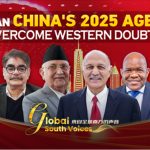Comparison between Western Democracy and Chinese Democracy
- - Dr. Yubaraj Sangraula

Kathmandu, 2021 July 1, Thursday
– Dr. Yubaraj Sangraula
The centennial celebration of the Communist Party of China (CPC) is a highly commemorative event for every Chinese national as well as individuals across the globe. The history of the CPC’s role and contribution in transforming Chinese society is robust and heartily felt in many ways. It encompasses a history that comprises a deeply felt patriotism of Chinese peoples.
This history also represents a course of restructuring of the Chinese society eliminating feudalism and foreign humiliation, thus transforming the lives of over a billion poor people of China. Most importantly, this history is instrumental for opening a way for a hope of new internationalism-driven harmoniously inclusive economic development across the globe.
These hundred years have witnessed five generations of human lives, but it is still considered brief from achievements CPC has bagged. Europe took almost five hundred years to step into modernity. But it failed to protect itself from the stigma of colonialism, racism, and distorted capitalism, which is responsible for creating a deeply rooted class division. Under this, a small segment of economic and political elites subordinated the overwhelming masses of the general populace.
In contrast, one of the most brilliant achievements of the CPC is its success in evolving a unique style of democracy where people are the masters of the nation. Thanks to the multiple generations of the CPC leaders, who tirelessly worked and sacrificed to build the Party as a platform of people’s liberation and socio-economic development.
We are aware that China, before liberation, suffered enormously. Foreign occupation placed independence of China to subjugation. The peoples of China suffered from unprecedented humiliation. They were turned into sick persons by the opium trade of European imperialist forces. The colonizers and occupiers institutionalized corruption and moral-laxness. Millions of Chinese people had been enslaved and forced to migrate abroad to work as menial workers. Many people died in desperation, looking for food and shelter. The foreign powers occupied territories of China and looted its resources; besides, they stigmatized its sovereignty. But China today stands taller as the second biggest global economy. And, this success is an output of the people-centric leadership of the CPC.
The Communist Party is leading China for 72 years since 1949, when the People’s Republic of China was grandly declared established at Tiananmen Square by Mao Zedong, the supreme leader and chairman of the Party, amidst tremendous fear bombardment by Chiang Kai-shek’s air force. However, the fear did not dissuade Chinese people from euphoric jubilation of liberation and freedom from the two hundred years long national humiliation and poverty. The year 1949 marked the end of the past and opened a new gateway for building people’s glorious China. The seed of success was formally planted in 1921 when CPC was founded; in 29 years of that event, PRC was established. Yet, these 29 years individually and collectively witnessed unprecedented sacrifice and hardships along with tumulus time, which claimed an unprecedented number of lives. In these 29 years, history saw sacrifices by thousands of soldiers, the massacres of over a million peoples, and the torture of millions. In the world’s history, only rare such sacrifices and hardships were recorded. The revolutionary march continued with undeterred aspirations of people and un-fatigued determination of leaders.
At the juncture of the centennial celebration of the founding of the CPC, Chinese leaders, communists, and general people are feeling jubilation. But this jubilation is also shared by millions of people across the globe. Why people beyond China also commemorate this auspicious occasion? Some Marxist intellectuals shared their views in a small gathering, intending to reflect on the reasons of the Nepalese communist movement’s failure to achieve similar glory. We agreed unanimously that the CPC leadership honest and accountable to the people and nation. But the Nepalese communist movement failed to protect the revolution from selfish interests, dishonesty to ideological conviction, and the lust of power in some leaders. The details of the century-long history of the CPC have many things to learn. But in my opinion, as a non-Chinese observer, the significance of this history may be conceptualized into three eventual successes and efforts of the CPC.
Rescue of Socialism after Cold War
In 1993, the Soviet Union as a state system collapsed. In its collapse, the Party’s bureaucratic red-tapism and densely flourished corruption had formed significant factors. Moreover, the entire capitalist world targeted the Soviet Union as a socialist country, though it had ceased to be essentially socialist quite long ago. But the Western media propagandized the collapse of the Soviet Union as the failure of socialism. Some Western scholars, like Fukuyama, even concluded that ‘History had come to an end.” Samuel Huntington came with another pernicious narrative that ‘the world’s future was going face the clashes of civilizations.’ For many such Western scholars, capitalism and liberal political systems possessed no challenge. Busied and Western-centric, their narratives intended to establish that Western liberal democracy was invincible and the so-called values nurtured by Western civilizations were universal. In essence, they concluded that communism or socialism inherently bear authoritarian ideologies and systems.
The centenary of the CPC and its success now show that the Western scholars were arrogant, parochial, and presumptive in their analysis or deliberations. Their biased and fallaciously coaxed and concocted narratives had hidden agendas behind them. First, they wanted to prove that the demise of the Soviet Union was undoubtedly the demise of socialism. By this narrative, they tried to feed the Western media and international community that the downfall of the CPC and PRC was the next inevitable event. These narratives spearhead strategic attacks against China’s socialist system. With the propaganda of these narratives, they also attempted to justify Western political and economic leverage in developing countries, including the East European socialist countries. They launched propaganda forcefully advocating that ‘the concept of liberal democracy, the rule of law, the independence of the judiciary and electoral process’ are universal values and are essentially connected with the protection of human rights. With these propagandas, they called for the new waves of democratic revolutions across the world.
They also argued that the world is unipolar, and it should remain unipolar if the world peace globalization has to flourish smoothly. In particular, the Western, the U.S. influence was then considered usual international affairs, followed by a policy of its interference political and development affairs of the third-world countries. The Western countries busied themselves to manufacture consent by launching global propaganda that ‘until socialism exists’ the world will face the challenge of instability and the cold war. The Tiananmen Square incident was a part of this propaganda and strategy. Yet, the brilliance of CPC leadership saved socialism in China unhurt. Deng Xiaoping’s ideas instilled a new ideology in the Chinese socialist revolution that ‘a socialist system is pragmatic’ and should avoid dogmatism. The message passed by the CPC’s policies for “Reforms and Opening-up” was that the socialist system must flow pragmatically, with the changed context of international and national affairs and socio-cultural realities of the society. It means that a socialist system cannot be Xeroxed from other societies.
The invention of a pragmatic ideology that China must have “Socialism with Chinese Characteristics” paved the way for China’s socio-economic development and protection of Marxism-Leninism as the fundamental science of socialism. With these innovative ideas, the Chinese socialist system stood unchallenged. Consequently, the Western narratives of the ‘end of history and clashes of civilizations’ proved wrong and presumptive and eventually disappeared. The contribution of the CPC to preserve and protect socialism as a progressive, pro-people and dynamic politico-economic system of people is imminent-no one disagrees with this fact. From the 1980s onward, the Chinese socio-economic development took an unprecedented pace, showing that the Chinese Socialist System and Democracy are dynamic, constructive, and innovative under the CPC leadership. Thus, the Western propaganda against China as an authoritarian regime slackened and became disapproved by the peoples across the world.
Over the last 30 years, the CPC’s role in building prosperity of people by elevating poverty of 500 million peoples, making unparalleled infrastructural development, progress of science and theology, and creating a hope of the peaceful world is outstanding either. It is pertinent to recall one of the dialogues between Mao Zedong and Liu Shouqi during the 1950s. Some issues they discussed were the necessity of addressing relations between the diversity of China such as Sea-connected China and hinterland China, the relations between Party and People, the relations between industrialization and agriculture and culture and development, to mention only a few. Attention to these critical relations itself presents the commitment of the CPC leadership to the well-being of the general people. After the 1970s, the CPC leadership succeeded in creating a pragmatic and rational balance between these dynamics or variables through reforms and opening-up policies. China has now successfully landed on the moon. It has made an absolute commitment to build a green world by addressing environmental problems. Most importantly, China has shown no inclination and interest to build itself as a hegemonic nation, affecting world peace. The rise of China under the CPC leadership is peaceful and inspiring.
Present China has maintained a democratic government, which is based on its unique style of democracy. The CPC’s remarkable success in achieving economic development and political stability leads us to conclude that Western democracy and its values are neither universal nor perfect. Admittedly, the COvid-19 responses of the Western developed countries show that their economic and political systems are grossly weak to face such challenges. The significance and effectiveness of the socialist system are proven in matters of the state’s accountability to the common people. Manifestly, the world has seen that the Western capitalism and liberal democracy have many weaknesses to save people’s lives—mainly, they have been unsuccessful in protecting the lives of working-class populations. The lack of inclination to respect the value of humanity and share life is seen typically as un-cosmopolitan. This fact is well evident from their policy of extreme protectionism in Covid-19 vaccines, which imposes restrictions on the export of vaccines to third-world countries, whereas, as appreciated by the World Health Organization, China’s assistance to fight Covid-19 is widely liberal and humanly.
To conclude this context, by succeeding in building a new horizon of socialism, China has successfully regenerated the hope to the bright future of socialism as a system accountable to the people. Through its constructive policies and programs, the CPC has proved competency to rescue socialism in the wake of the collapse of the Soviet Union and relentless attacks from Western propaganda. A pragmatic blend of market principles and socialist ideologies has shown a new hope of prosperity for the poverty-stricken populations across the globe. Similarly, its success in evolving a unique style of democracy is equally inspiring to the rest of the world, exceptionally when liberal democracy has been turned into a system of unending corruption, criminalization of politics, and electoral democracy. Nepal and other South Asian countries are glaring examples. Nepal failed to realize a socialist path mainly because of its model of democracy that proved unyielding and unaccountable to the people. This system, like in India, does not feel that democracy must work for the benefit of the people.
Inclusive international cooperation for development with shared future
In the post-Second World War era, the Washington-driven economic cooperation through the IMF and World Bank generated, in the words of Joseph Stieglitz, discontents among developing countries across the world. The IMF and World Bank explicitly worked as instruments of U.S. foreign policy. Their policies widened the inequality of income and wealth distribution, thus increasing the poor population across the world. Most spectacularly, the Western economic cooperation attached its political influence as a precondition, forcing the recipient nations to compromise in their sovereign independence. The Western model of international collaboration remained neither inclusive nor did it encourage a humanly sophisticated approach. The Western commitment of respect to the rule of law and human rights stood as a sheer hoax.
However, the Chinese policy of international cooperation shows a distinct approach, which has been precisely explicit during the crisis of Covid-19. The Chinese support reached every corner of the world, stressing its humanitarian commitment. The international development partnership under the BRI model is another example. Under President Xi Jinping’s tenure, the concept of BRI emerged as a perfectly new orientation in international development cooperation. While BRICS and AIIB are seen as new instruments of flowing financial resources for the infrastructure developments, the BRI as a global development partnership forges out a new partnership model, particularly from the vantage point of sharing resources. The goal of building a connected world through a belt and road concept is remarkably free from the risk of compromise in the sovereignty of partnering countries.
Most importantly, BRI avoids a policy of exporting ideologies. Mutual respect to the state systems is an antithesis against seeking political leverage that has been promoted by Western countries in the past, under the guise of international cooperation. Understandably, the model of international assistance practiced by Western governments and international organizations has contributed to the adverse impacts of the recipient countries’ economy and political systems. The disposition of BRI is unique and is marked by inclusivity and the common destiny of humanity.
Conclusions
While evaluating the centennial success of the CPC as an outsider or non-Chinese national, the three contributions of the CPC form significant spheres for learning. They manifest a need that it is a time for the world to learn from Chinese innovative political, economic, and social commitments to the people. The Chinese people’s flourishing trust in the CPC leadership suggests that the style of democracy it represents is inspiring and innovative. It is innovative because it is committed to serving the people by ending all vestiges of corruption, rendering the people the masters of the country and subjecting the CPC leadership to authority. A party is an instrument for serving the people; it cannot be a ruler like dynasties of kings and exclusive privileges of aristocrats. Enjoying the state’s power by competing to the position with corrupt practices of elections cannot empower people to rule by themselves. Incorruptible, moral, and benevolent leadership is possible only in a system of democracy that works for social security, social justice, environmental protection, and human dignity of the people, which are seriously lacking in the transplanted liberal democracies in developing countries like Nepal.
Unfortunately, Nepal Communist Parties have demonstrated gross incompetence to observe and learn from what the CPC has achieved in hundred years. The Communist leaders of Nepal, an exception to a few, are seen grossly affected by a tendency of (a) non-committalness to the Marxism-Leninism as a core ideology to pursue, thus lacking socialist ideological and moral foundation, (b) unaccountability to the socio-economic security and prosperity of general people, thus failing in responsibility of keeping themselves out the helm of power-mongeneses, (c) lacking a vision of developing socialism with typical Nepalese characteristics, focusing into a reality of its geopolitical reality, challenging geographical landscape and utter want of expertise and technology, (d) lack of sincerity to political honesty and patriotism, which has led them to ignore or overlook the history and unique culture evolved for over 3000 years long history, (e) disinclination of learning from neighbors in the activism of socio-economic development, and (d) influence of the Western cultural hegemony.
One of the biggest failures of the political parties in Nepal relates to their incompetency of seeing the significance of BRI, which may contribute to the infrastructure development and transform Nepal as a bridge between China and South Asia. Failure to prevent an implicit conflict between BRI and MCC is a gross mistake of the Nepalese political leaders, the communist leaders in particular. Admittedly, they have pushed the traditionally stronger relationship between China and Nepal to extremely low ebb. The division and conflict in the Party have virtually destroyed the trust of people over the ability of communist leaders to build a workable model of socialism as aspired by the 2015 Constitution. Hence, the Nepalese communist leaders and intellectuals must take the occasion of the centennial commemoration of the CPC as an opportunity to reflect on their past mistakes. They must understand that time will not wait longer for them. In the meantime, like professors and students of Peking University, Nepalese intellectuals and students must dedicate their efforts to build a pragmatic socialist system in Nepal because the hope with current communist leaders is rapidly fading.
(Prof. DR. Yubaraj Sangroula is a executive director of Kathmandu School of Law and Former Attorney General of Nepal Government)










